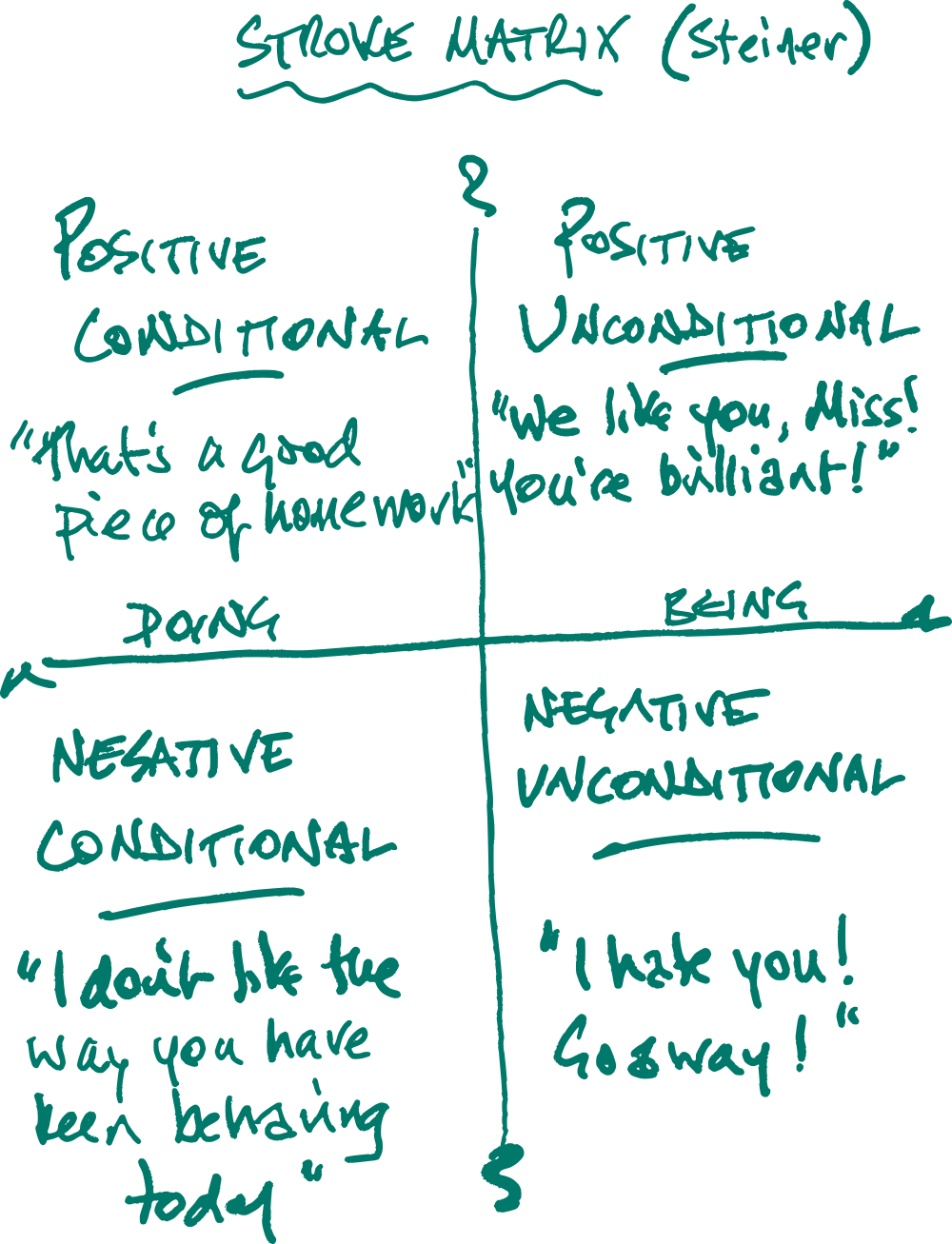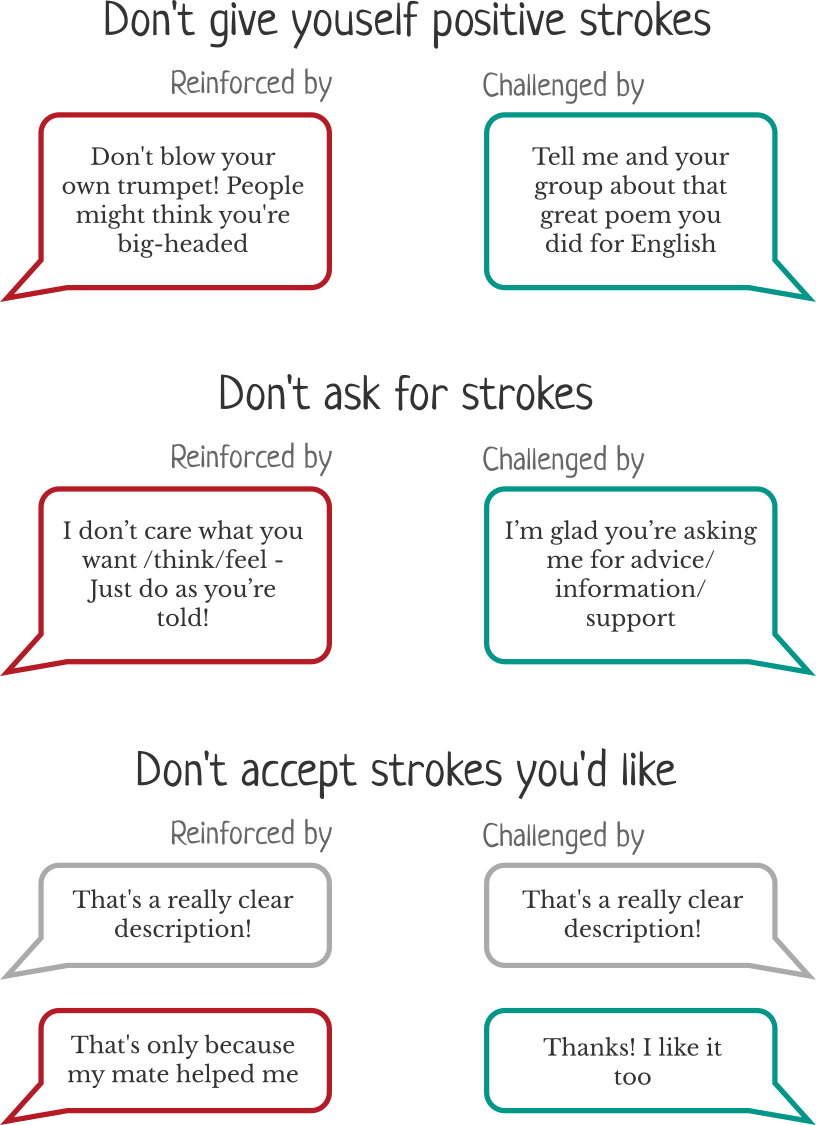Strokes
Stroke Theory: The Importance of Recognition
From the moment we are born the need to be recognised – noticed – is one of the three human priorities (the other two being the need for stimulus and structure). Not surprisingly newborn babies are exceptionally adept at both gaining attention and giving attention from and to others.
Within this model a stoke is defined as ‘a unit of human recognition’. In the first few hours and days of life the baby becomes aware that they have been noticed because they are literally stroked; physical caresses and being held, for instance. However, as the infant develops they begin to know that they have been noticed by non-verbal communication, eg. the frowns, smiles, raised eyebrows, posture etc. By around 18 months the child begins to be aware that they are noticed because of what is being said to them. Consequently strokes can be physical, non-verbal and verbal forms.
There are four broad types of stroke as presented in the stroke matrix. As the child develops they become familiar with specific patterns of stroking. For example a child might be accustomed to receiving non-verbal and verbal negative conditional strokes. Another child might be more familiar with physical unconditional positive strokes and verbal conditional positive recognition.

In many respects there is a parallel with a diet of food. In other words, a child’s stroke quotient becomes integral to who they are (‘you are what you eat’). The specific stroke ‘diet’ is integral to maintaining a sense of self and as time goes on it becomes an embedded part of personality. Consequently by the time the child is in adolescence they will have a clear idea of what type of strokes they filter in and those that are filtered out. This stroke filtering can be governed in several ways, one of which is understood via the concept of a stroke economy.
- Don’t ask for strokes you want
- Don’t accept strokes you want
- Don’t give yourself strokes
- Don’t reject strokes you don’t want
- Don’t give strokes you have to give
Each of these indicates a way in which the individual or group limit the capacity for strokes which can be both challenging and growthful. Whilst strokes are relevant for making sense of individual behaviour they can also be used to understand patterns of group and organisational behaviour. The following questions are intended to prompt reflection on the day-to-day practice in the teaching and learning relationship.
Top Tips
Children can pick up unhelpful ideas about strokes. The common misunderstandings are listed below with examples of how they can be reinforced and how healthy change can be encouraged.
It can be worth remembering the following:
What you stroke is what you get
What you get is what you stroke
So, what kind of stroke culture do you want for your classroom?
Basic Hungers
Berne identified a series of hungers which he argued are core to our existence. The three basic hungers are:
-
Stimulus
We need something to do, to arouse our senses, stimulate curiousity -
Recognition
Our need for attention, in other words the giving and receiveing of strokes. -
Structure
We need to know where we stand, a sense of direction/purpose and crucially a way of managing time
Other hungers were also referred to in the early writing in TA including the hunger for leadership and incidence.
The three basic hungers begin to emerge from birth and the individual develops an elaborate scheme through which to satisfy them. Berne observed that an important way in which this is evident is in the way the individual structures their time.
Time Structuring
Typically there are six ways in which people spend time and in doing so generate a unique profile of doing so that meets their respective need for stimulus, recognition and structure.
In schools, these can demonstrate themselves as follows:
-
Withdrawal
Keeping away from others; hiding absenting themselves, withdrawing into themselves even though present -
Ritual
Taking part in the predictable etiquette of school life, eg. attending assemblies, taking register etc. -
Pastiming
Talking about nothing in particular but nevertheless passing the time of day. Discussions are not intended to lead to action and whilst past-timing may be a prelude to action, for some individuals it can be a way of stalling doing anything purposeful (and there’s usually a good reason to do so) -
Activity and Game-Playing
In healthy situations people move from past-timing into purposeful activity. Where this isn’t the case people engage in familiar but unhelpful game-playing -
Initimacy (Closeness)
Just occasionally it might be possible and appropriate for enduring relationships to be established where there is a level of candid closeness

